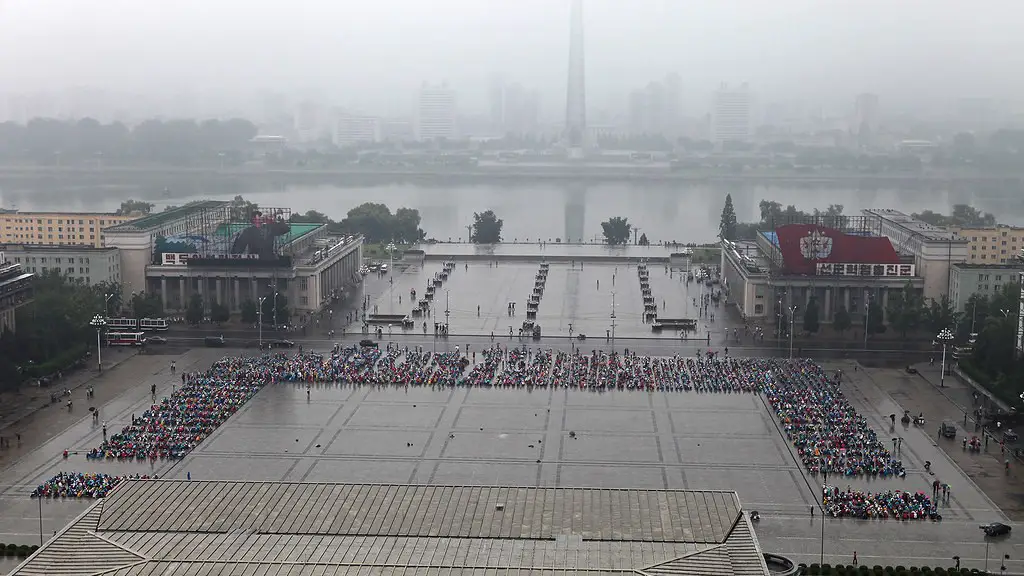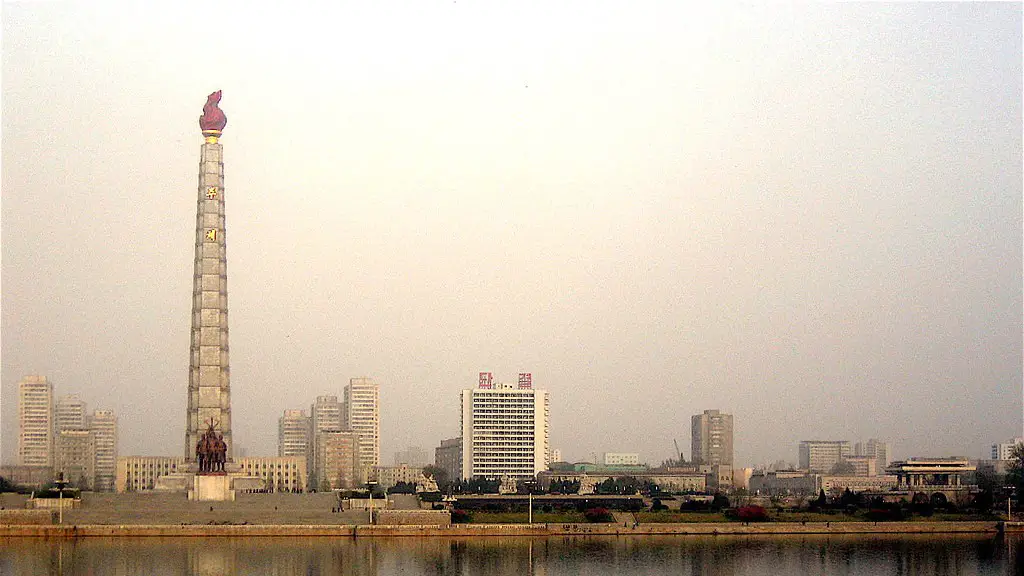The question of South Korea invading North Korea has been a subject of much speculation and debate over recent decades, with many arguing that it would be an illegal act of war under international law. While an invasion of North Korea is unlikely, it is an important topic to consider from a geopolitical perspective. South Korea, in particular, is surrounded by an unpredictable and dangerous neighbour and the consequences of such a move could be devastating for both countries.
The first point to consider is the geopolitical positioning of both countries. South Korea is a democracy and its economy is thriving, while North Korea is a totalitarian autocracy with a floundering economy and increasingly strained international relationships. It is clear that any sort of intervention in North Korea could be seen as an act of aggression, and could lead to a prompt and serious reaction from Kim Jong-un.
The military power of both nations is another important factor in analysing the situation. South Korea has one of the most powerful and sophisticated armies in the world, and its military is supported by modern weapons and hi-tech communication systems. North Korea, on the other hand, is severely under resourced, with outdated weaponry and a much smaller army. It is also believed that North Korea has an extensive weapons of mass destruction (WMD) program and has the ability to launch nuclear weapons.
Experts have also raised the possibility of a North Korean counter-invasion should South Korea attempt to invade. While North Korea is unlikely to pose a threat to South Korea’s military forces in its entirety, it is still possible that the North could launch a large-scale offensive attack against the South with the aim of destabilising the region. While the North may not be in a position to win any kind of armed conflict, a sustained attack could still cause a great deal of damage and disruption.
The potential for a wider conflict should also be considered. China, for example, is North Korea’s main ally and any action against the North could be seen as an act of aggression against the Chinese government. It is therefore highly likely that China would come to the aid of North Korea should they launch a counter-invasion. Russia, too, has historically been supportive of North Korea and may enter the conflict in the event of an invasion.
The economic impacts of a potential South Korean invasion of North Korea must also be taken into account. South Korea would have to bear the brunt of the economic costs associated with such a move, and the economic consequences would be far-reaching. South Korea is already grappling with an ageing population, increasing unemployment and a struggling economy; any further disruption to the economy could be disastrous for the South.
Political Repercussions
On top of the potential military and economic repercussions of a South Korean invasion of North Korea, there are also significant political ramifications. North Korea’s government is hostile and unpredictable, and any fight for control of the country could trigger a period of immense political instability. It is highly likely that such instability could further destabilise the region as a whole, causing further political and economic chaos.
Furthermore, such a move may hurt South Korea’s already fragile diplomatic relations with its Asian neighbours. South Korea’s relationship with Japan and China, in particular, have been strained in recent years, and an invasion of North Korea could potentially push those relationships further away. South Korea is also reliant on US military support, and any action taken against North Korea could have a direct impact on the US-South Korean relationship.
Finally, it is important to consider the impact such a move would have on the people of North Korea. The North Korean people suffer under an oppressive regime, and any kind of intervention from the South would be met with resistance and anger. It is clear that such a move would only worsen the human rights situation in North Korea, and could ultimately prove counter-productive.
Humanitarian Implications
The humanitarian implications of a South Korean invasion of North Korea are also far-reaching. South Korea is already home to tens of thousands of North Korean refugees, and any intervention could cause a huge increase in the already large population of displaced people. This could put an immense strain on South Korea’s already fragile resources and could worsen the already challenging situation faced by North Korean refugees.
There is also the potential for a huge loss of life should South Korea invade North Korea. A conflict on the scale of such an intervention could cost the lives of thousands of civilians on both sides of the border and further destabilise the region. This could have a serious humanitarian impact on the people of North and South Korea, as well as the wider region.
Finally, any move to invade North Korea could put the South Korean government in direct conflict with international law. Many argue that the north has been subjected to numerous human rights violations and any action to intervene in the country could be seen as a violation of international law. This could lead to sanctions and other punitive measures, which could significantly limit South Korea’s ability to act in the international arena.
International Response
The international community has a vested interest in the stability of the Korean peninsula, and any move to intervene in the situation could be met with a response from the wider community. The United Nations could uphold its resolution to ensure that any move towards an invasion of North Korea is in line with international law and its aims of preserving peace and security. Other countries, such as the United States, China, and Japan, could impose sanctions or other punitive measures to dissuade South Korea from taking such a move.
The potential ramifications of a South Korean invasion of North Korea are immense and far-reaching, and it is clear that such a move would be a huge gamble. South Korea is in a precarious geopolitical position, surrounded by an unpredictable and hostile neighbour, and any intervention could have severe consequences for the region. It is therefore important to consider these factors carefully when discussing the potential for an invasion of North Korea.
Regional Consequences
The consequences of a South Korean invasion of North Korea could be vast, and would likely have serious implications for the wider region. Japan, China and Russia, in particular, could all be drawn into the conflict and the political, economic and military landscape of the region could be drastically altered. It is clear that any move to intervene in the situation must have the support of the wider international community in order to be effective and prevent unnecessary violence and destruction.
The South Korean government must also be mindful of the potentially volatile nature of the situation. North Korea is a hostile and unpredictable neighbour, and any move to intervene could lead to a desperate and unpredictable response from the North. South Korea’s position as a democracy makes it particularly vulnerable to such a response, and further destabilisation of the region could have severe consequences.
It is also important to consider the human costs of any potential conflict. North Korea is already subject to serious human rights violations and any intervention could further exacerbate this situation. Furthermore, a conflict on the scale of an invasion would undoubtedly cost the lives of thousands of civilians, and could deepen the suffering of the North Korean people, as well as those of South Korea.
Conclusion
In conclusion, it is clear that an invasion of North Korea by South Korea would be a complex and risky move. There are numerous geopolitical, political, military, economic, humanitarian and international ramifications of such a move, and all of these must be carefully considered before any kind of intervention is attempted. South Korea is surrounded by a powerful and unpredictable neighbour, and any move to intervene in North Korea could have far-reaching consequences that would have a serious impact on the region as a whole.




